Add this eBook to your basket to receive access to all 229 records. Our indexes include entries for the spelling pomeroy. In the period you have requested, we have the following 229 records (displaying 151 to 160): These sample scans are from the original record. You will get scans of the full pages or articles where the surname you searched for has been found. Your web browser may prevent the sample windows from opening; in this case please change your browser settings to allow pop-up windows from this site. Boys entering Uppingham School
(1883)
The public school at Uppingham in Rutland was founded by Archdeacon Johnson in 1584. A roll of scholars from 1824 to 1905 was edited by J. P. Graham, and published in 1906. This was a revision and updating of an 1894 edition of the roll, the great bulk of the work having been done by Mrs Mullins. The roll is arranged by year, and within each year by term of entrance, and then alphabetically by surname within each term. Each boy's name is given, surname first, with an asterisk where known (in 1906) to have died. Then there is month and year of birth, father's name (most often just surname and initials) and address (at entrance). Where the boy represented the school at Rugby football (XV) or cricket (XI), that is indicated. After the month and year of leaving the school, there is a brief summary of achievements in later life, and, where known, address as in 1906. From 1875 onwards the house within the school is also noted, with these abbreviations: A., Mr Constable's House; B., Brooklands; C., West Bank; E., Mr J. Gale Thring's House; F., Fircroft; Fgh., Farleigh; H., Highfield; L., The Lodge; L. H., Lorne House; M., Meadhurst; N., The Hall; R., Redgate; R. H., Red House; S., School House; and W. D., West Deyne. | Sample scan, click to enlarge
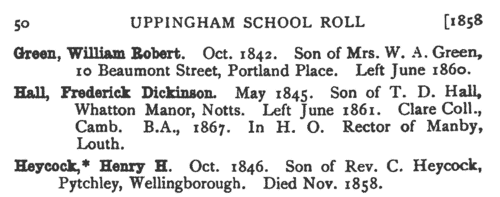
| Debtors, Insolvents and Bankrupts
(1886)
Bills of sale (binding assets to a creditor/lender), insolvencies and bankruptcies in England and Wales, April to June 1886 | Sample scan, click to enlarge

| Inhabitants of Holywood in county Down
(1886)
George Henry Bassett's County Down Guide and Directory aimed to be 'A book for Manufacturers, Merchants, Traders, Land-Owners, Farmers, Tourists, Anglers, and Sportsmen generally.' It is a good general directory, listing gentry, tradesmen and farmers. (The sample scan is from the introduction).
| Sample scan, click to enlarge
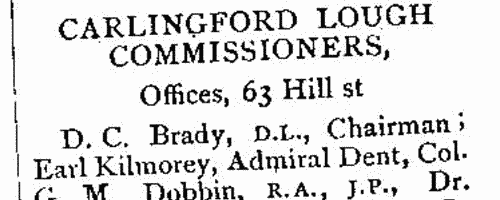
| Irish Debtors and Bankrupts
(1886)
Bills of sale (binding assets to a creditor/lender), and bankruptcies in Ireland, January to March 1886 | Sample scan, click to enlarge

| Missing Heirs in Chancery Suits
(1886)
The Unclaimed Money Registry and Next-of-Kin Advertisement Office of F. H. Dougal & Co., on the Strand in London, published a comprehensive 'Index to Advertisements for Next of Kin, Heirs at Law, Legatees, &c., &c., who have been Advertised for to Claim Money and Property in Great Britain and all Parts of the World; also Annuitants, Shareholders, Intestates, Testators, Missing Friends, Creditors or their Representatives, Claimants, Unclaimed and Reclaimed Dividends and Stock, Citations, Administrations, Rewards for Certificates, Wills, Advertisements, &c., Claims, Unclaimed Balances, Packages, Addresses, Parish Clerks' Notices, Foreign Intestates, &c., &c.' The original list was compiled about 1880, but from materials dating back even into the 18th century: most of the references belong to 1850 to 1880. For each entry only a name is given, sometimes with a placename added in brackets: there may be a reference number, but there is no key by which the original advertisement may be traced. The enquirer of the time had to remit £1 for a 'Full and Authentic Copy of the Original Advertisement, together with name and date of newspaper in which the same appeared'. This section of the 1886 edition was devoted to 'Unclaimed Property in Chancery': "THE following is a list of the titles of causes in the Court of Chancery, to the credit of which funds have remained unclaimed for many years, and for which ADVERTISEMENTS have appeared calling upon the NEXT-OF-KIN, HEIRS-AT-LAW, and LEGAL PERSONAL REPRESENTATIVES to come in and establish their claims. In every case the amount UNCLAIMED is upwards of FIFTY POUNDS." | Sample scan, click to enlarge
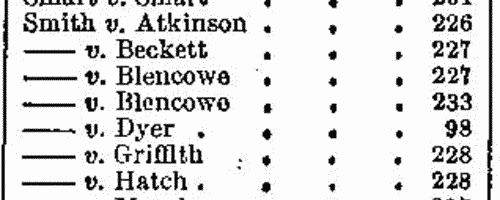
| Debtors, Insolvents and Bankrupts
(1887)
Bills of sale (binding assets to a creditor/lender), insolvencies and bankruptcies in England and Wales, January to March 1887 | Sample scan, click to enlarge

| Boys entering Uppingham School
(1888)
The public school at Uppingham in Rutland was founded by Archdeacon Johnson in 1584. A roll of scholars from 1824 to 1905 was edited by J. P. Graham, and published in 1906. This was a revision and updating of an 1894 edition of the roll, the great bulk of the work having been done by Mrs Mullins. The roll is arranged by year, and within each year by term of entrance, and then alphabetically by surname within each term. Each boy's name is given, surname first, with an asterisk where known (in 1906) to have died. Then there is month and year of birth, father's name (most often just surname and initials) and address (at entrance). Where the boy represented the school at Rugby football (XV) or cricket (XI), that is indicated. After the month and year of leaving the school, there is a brief summary of achievements in later life, and, where known, address as in 1906. From 1875 onwards the house within the school is also noted, with these abbreviations: A., Mr Constable's House; B., Brooklands; C., West Bank; E., Mr J. Gale Thring's House; F., Fircroft; Fgh., Farleigh; H., Highfield; L., The Lodge; L. H., Lorne House; M., Meadhurst; N., The Hall; R., Redgate; R. H., Red House; S., School House; and W. D., West Deyne. | Sample scan, click to enlarge
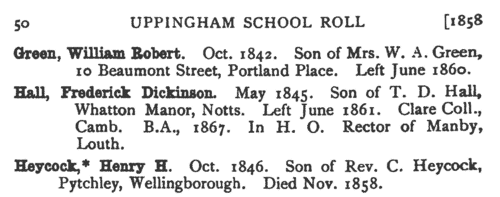
| County Court Judgments: Devon
(1890)
Extracts from the Registry of County Courts' Judgments. These judgments were not necessarily for debt. In some cases they were for damages on properly disputed causes of action, but no distinction was made on the Register. Judgments settled otherwise than through the Court may appear, unless 'Satisfaction' was entered up within the fourteen days allowed for that purpose. These printed extracts include occasional notes giving more detail about certain cases, and also list Satisfactions entered on the Register. | Sample scan, click to enlarge

|  London Policemen
(1878-1891) London Policemen
(1878-1891)
The Metropolitan Police Register of Joiners (MEPO 4/335) lists policemen joining the force 1 July 1878 to 31 December 1891 (warrant numbers 62845 to 77318). The register is alphabetical, in so far as the recruits are listed chronologically grouped under first letter of surname (I and J, and U and V being treated as single initials). It gives Date of Appointment, Name, Number of Warrant, Cause of Removal from Force (resigned, dismissed, promoted or died), and Date of Removal. | Sample scan, click to enlarge

| Boys entering Clifton College
(1892)
Clifton College near Bristol was established in 1862. This edition of the Clifton College Annals and Register for the Old Cliftonian Society by F. Borwick was published in 1925. Boys are listed alphabetically by term of entry, with full names, surname first, in bold. Father's (or widowed mother's) name is given (surname and initials) in capitals, and address. Then there is the name of the house (N. T., North Town; S. H., School House; S. T., South Town), first and last forms, distinctions in school work and games, and month of leaving. Where known, the editor then gave a career summary with month of death; or, if still living, address as in 1925 (in italics). | Sample scan, click to enlarge
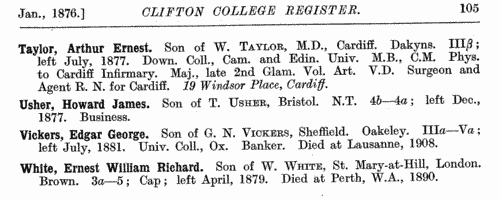
|
Research your ancestry, family history, genealogy and one-name study by direct access to original records and archives indexed by surname.
|












